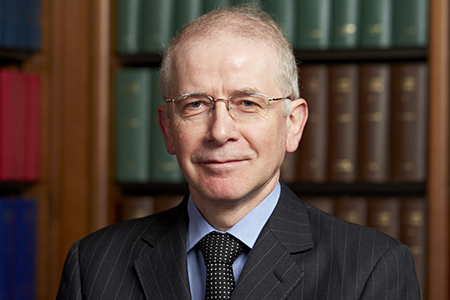01/2018 - News release
Lord Reed named Deputy President of the Supreme Court
29 May 2018
The Right Hon Lord Reed has been appointed Deputy President of the Supreme Court, it was announced today.

Her Majesty The Queen made the appointment on the advice of the Prime Minister and Lord Chancellor, following the recommendation of an independent selection commission.
Lord Reed will replace the Right Hon the Lord Mance who retires on Wednesday 6 June 2018 after serving for four years as a Lord of Appeal in Ordinary, then eight years as a Justice of the Supreme Court, and finally as its Deputy President since September 2017.
Following his appointment today, Lord Reed said:
"It is a great honour to succeed Lord Mance as Deputy President of the Supreme Court. I look forward to working with Lady Hale in providing leadership to the Court. I am committed to promoting the Court's role and activities, both in our national life and internationally."
Lady Hale welcomed the appointment, saying:
"I am delighted to congratulate and welcome Lord Reed on his appointment as Deputy President of the Court. He is a most distinguished and deeply principled jurist. Since joining the in 2012 he has made a significant contribution in many areas, but in particular in developing the common law and championing the rule of law and access to justice. I am confident that the court will be well served by his appointment and that together we will make a great team."
Lord Reed was appointed as a Justice of the Supreme Court in February 2012. He was from 2008 to 2012 a member of the Inner House of the Court of Session, and from 1998 to 2008 a member of the Outer House of the Court of Session, where he was the Principal Commercial Judge.
He studied law at Edinburgh University and undertook doctoral research in law at the University of Oxford. He qualified as an advocate in Scotland and as a barrister in England. He practiced at the Scottish Bar in a wide range of civil cases, and also prosecuted serious crime.
As well as sitting on the Supreme Court and the Judicial Committee of the Privy Council, he is also a member of the panel of ad hoc judges of the European Court of Human Rights, and is a Non-Permanent Judge of the Court of Final Appeal in Hong Kong. He is also the Visitor of Balliol College, Oxford.
The role of Deputy President involves working alongside the President to oversee the judicial work of the Court, and liaising closely with the Chief Executive who manages the Court's administration. The Deputy President also shares a wider leadership and ambassadorial role with the President, undertaking a range of engagements to promote understanding of the role of the judiciary and senior appellate courts in the UK and to foster international links.
Details of Lord Reed's swearing-in ceremony will be announced in due course.
Notes to Editors
1. The selection process for the Deputy President position is mostly set out in statute (the Constitutional Reform Act 2005). In short, the steps usually undertaken by the independent selection commissions (once convened by the Lord Chancellor) are:
- Consultation with the Lord Chancellor on the positions to be advertised and the process of selection.
- Candidates are invited to submit a personal statement. The basic eligibility criteria are set by Parliament.
- The statute also requires that the Lord Chancellor, the First Minister in Scotland, the First Minister in Wales, the Judicial Appointments Commission in Northern Ireland and senior judges across the UK are consulted as part of the selection process.
- Candidates are interviewed by the commission. Under changes introduced by the Crime and Courts Act 2013, where two candidates are deemed to be of equal merit, the commission can give preference to one candidate over the other for the purpose of increasing diversity within the Court.
- After interviews, a report is sent to the Lord Chancellor for his consideration. There is another round of consultation with the senior politicians and judges. The Lord Chancellor then accepts the recommendation(s), or can reject it, or ask the commission to reconsider.
- When the Lord Chancellor accepts a recommendation, the name is notified to the Prime Minister and HM The Queen. Candidates are informed of the outcome, and the Prime Minister's Office then makes an announcement.
The procedure for appointing a Justice is detailed on the Supreme Court website:
- Appointments of Justices (PDF version)
- Review of process supporting independent selection commissions for Supreme Court (PDF version)
2. The launch of the Deputy President competition was announced on the Supreme Court website on 13 December 2017. The role was open to applications from serving Justices and from the widest range of eligible candidates outside the Court, particularly those who will increase the diversity of the Court. The competition was open to candidates from any part of the United Kingdom and with any professional background which meets the statutory criteria for appointment.
Details of the recruitment process can be found in the Judicial Vacancies news story news story on the Court's website.
Ends
UKSC contacts:
Sophia Linehan-Biggs - Head of Communications
020 7960 1887
Rebecca Lowson - Media and Communications Manager
020 7960 1894